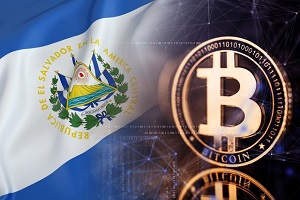IMF Warns People Against Using Crypto as National Currency Ahead of the El Salvador Launch
 Everyone already knows that the country of El Salvador is the first in the world to switch its national currency for Bitcoin. The Latin America country has gone all in on the crypto and became the first country in the world where you can pay with Bitcoin for anything. That hasn’t made banks happy, and the move was further criticized by leading governments around the world.
Everyone already knows that the country of El Salvador is the first in the world to switch its national currency for Bitcoin. The Latin America country has gone all in on the crypto and became the first country in the world where you can pay with Bitcoin for anything. That hasn’t made banks happy, and the move was further criticized by leading governments around the world.
Now, the IMF has had their say in it, with a recent blog post claiming that switching to cryptocurrencies can threaten the macroeconomic security and stability in the world, while also harming financial integrity. Cryptocurrencies and Bitcoin have long been linked to illicit activities, and that’s what the IMF fears the most.
The blog post didn’t specifically talk about El Salvador, but was more of a general warning. However, since its currently negotiating a massive loan with the Latin American country, it’s clear where the comments are aimed.
A Dangerous Experiment
Ricardo Castaneda, senior economist and coordinator at the Icefi think-tank, thinks that El Salvador is playing with fire. He believes they haven’t thought through all the implications, calling the switch to Bitcoin a dangerous “experiment”. The consequences of this choice can be pretty serious as soon as Bitcoin becomes legal tender in the country from September 7.
El Salvador’s president Nayib Bukele shocked everyone a couple of months back when he announced that Bitcoin becomes legal tender in the country from September 7. It’s the first country to do so, allowing its citizens to pay for everything from haircuts to taxes in BTC. Of course, his plan didn’t go without prior research.
In 2019, El Salvador established Bitcoin Beach, a surf resort where locals were paid in Bitcoin and used it for transactions. The pilot program was backed by an anonymous US Bitcoin donor, and it proved a success. It was the biggest catalyst in Bukele’s decision that should help around 70% of the population that doesn’t have access to traditional finances.
El Salvador adopted the US Dollar 20 years ago. Bukele plans to place some central bank reserves in crypto. To incentivize its use, its giving away $30 in Bitcoin to all citizens for free via the Chivo e-wallet.
No Help from the World Bank
As soon as Bukele announced his plans, he was under a lot of fire from the World Bank. It refused to help with the plan’s rollout, and now the IMF is warning about the implications of this move. The country is facing a serious fiscal situation, with a debt that currently stands at 89% of GDP. El Salvador has around $2 billion in debt repayments this year, which is what led to the controversial move.
Not everyone is excited about Bitcoin becoming legal tender in the country. Nearly half of the people expect it to make the economy worse, while others are either reserved or don’t have a clear opinion. It remains to be seen what happens in just under a month when the cryptocurrency goes live.







